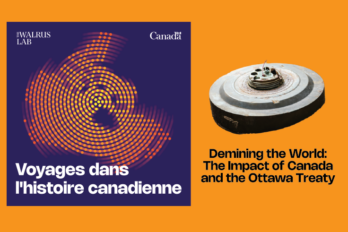HOST: Canada has a lot of work to do to improve relationships with Indigenous communities. But how will we get there as a country? According to Roberta Jamieson, the solution goes beyond charity. It requires philanthropy based on Indigenous reciprocity. Roberta Jamieson is a Mohawk woman from Six Nations of the Grand River, Ontario.
ROBERTA JAMIESON:
Good evening all, I’m Roberta Jamieson. I first acknowledge and honour all the centuries of Indigenous peoples who went before us on these lands on which we meet tonight. Tkoronto is the name of this place in Mohawk, my language. It means the place of the log in the water, on the beautiful lake. And that’s where we’re meeting tonight (Toronto, in English, of course). tonight’s topic is philanthropy, but I want to talk about Indigenous reciprocity, decolonized philanthropy. One might say reciprocity is a deeply rooted concept amongst Indigenous peoples internationally. In fact, because we all learn about reciprocity from the way nature works. Nature’s bountiful and generous philanthropy acts not for altruism, not for benevolence, but giving to keep the cycles of life moving and strengthening Indigenous reciprocity almost always arises from a relationship involving mutual respect, humbleness, joy, and appreciation as the Cherokee philosopher, brilliant woman, Rebecca Adamson puts it.
And I quote, “I honour you by giving you, honour me by receiving.” You see, all this is built into the treaty relationship, which is the very foundation of Canada’s existence. History tells us that it was Indigenous people who agreed to allow a portion of their lands to be taken up for immigration and settlement to begin a mutually reciprocal relationship. The spirit and intent of treaties was Indigenous philanthropy at its best. One might say the sharing of lands. So two peoples could live side by side in peaceful coexistence and mutual support. Well, somehow the idea of colonisation of the Indians got in the way. So for the next few minutes, I want to think aloud about the decolonization of philanthropy in its relationship with Indigenous peoples to develop. I want to talk about developing a reciprocity as a tool in decolonizing, the terribly damaging negative relationship, which has prevailed in this country, particularly since 1867.
Am I saying that philanthropy is a part of a colonial approach? There are notable exceptions, but well, yes, any approach that starts out with the premise of helping the Indians to participate in our society is not that much different than a government, which decides or a church, which decides that we, what we need our residential schools, what we need is to be freed from our traditional communities. What we need is to move to the city and prosper. And so on.
What we really require is respect and space to determine our own future, to make our own decisions as Indigenous peoples space in Canada, to take our rightful place. Well, yes, and one requires access to resources to realise that potential well, all of this is where decolonized philanthropy, reciprocal philanthropy has a welcome role and offers such promise of mutual enrichment. The potential of reciprocity can be realised when two parties work together towards a shared goal. In those terms, the potential of philanthropy in moving to reciprocity offers the opportunity for two cultures to come together, to move beyond assessing blame and instead concentrate on the creation of solutions. So that’s the question we ask a philanthropy: can we develop these decolonized reciprocal relationships with Indigenous peoples not to help them, not because poor and needy, of course we are poor and needy as a result of colonisation. So more of that, it’s not going to be the solution.
Instead, we require support to strengthen our ability, to make our full contribution to society and to the future of everyone’s children, whether that’s in traditional healing, living in harmony with the environment, conflict resolution, these enriching things that we are missing out on in this country, if that’s all to happen, then we have to work together. We’ve got to change the rules of engagement. If we’re to move philanthropy into recipe reciprocity, it means building nourishing, cherishing a longterm relationship. This means relationships which really cherish opportunities for giving and giving back many times over Indigenous reciprocity requires development of an interconnectedness of the parties involved. It requires building networks of trust. It requires building friendships. It implies that we truly see ourselves as part of the same hole. There is no room in our way of thinking for us and them. Everyone is us members of the same family, children of the same earth, part of the same creation.
Again, quoting Rebecca Adamson, she said the traditional philanthropic paradigm is a transaction. One gives the other receives. This is alien to most Indigenous communities where givers become receivers, who become givers. If we want to change outcomes in Indigenous communities, the first step for donors is self reflection and quote. We need to understand that cash cannot buy relationships nor can it be a substitute for human involvement to see that transparency, trust and compliance are natural components of good healthy relationships inspire the charity of which I’m privileged to be CEO and president is all about reciprocity. Of course, we raise funds and millions of dollars annually and have provided $80 million through twenty-five thousand bursaries. So Indigenous students can realise their potential as Indigenous people.
We’ve never thought of this as philanthropy nor do the students think of themselves as recipients of benevolence. Rather it is pure reciprocity. We support Indigenous students so that they can realise their immense potential to achieve for their own wellbeing and that of their families, their communities, their nations, Canada, and the world, Indigenous students implicitly understand the reciprocity that is involved here. The obligation they accept as recipients, the obligation to keep the cycle of giving moving. We hear it over and over. They want to give back to use their potential to improve the well-being not only of human life in their communities, but the wellbeing of our mother, the earth, if our current generation of Indigenous youth Canada’s fastest growing demographic group is supported so they can become achievers as Indigenous people validated in that identity and with space for them to make their contributions, they will bring change.
There are change agents in their circumstances, their families, their communities, and Canada. We will be so much richer for it. I am so privileged and proud to be part of this reciprocity engine. I invite you to join in this reciprocal project. I offer these thoughts to you as perhaps the most important thing I do in my life is be a Dota. I’m a grandmother and I have responsibilities as a result and being part of giving back and sharing and providing support and opportunity to enrich our young people, this country and the world, frankly, is a wonderful gift. I offer these thoughts to you as a contribution of Indigenous thought to philanthropy. Thank you for listening to my words.





